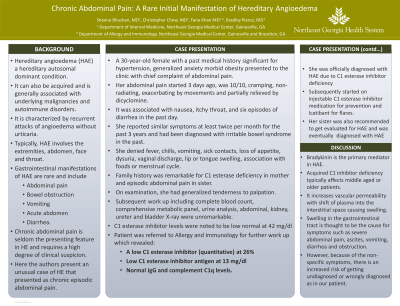Tuesday Poster Session
Category: Functional Bowel Disease
P3386 - Chronic Abdominal Pain: A Rare Initial Manifestation of Hereditary Angioedema
Tuesday, October 24, 2023
10:30 AM - 4:00 PM PT
Location: Exhibit Hall

Has Audio

Sheena Bhushan, MD
Northeast Georgia Medical Center
Atlanta, GA
Presenting Author(s)
Sheena Bhushan, MD1, Christopher Chew, MD2, Faria Khan, MD2, Bradley Pierce, MD2
1Northeast Georgia Medical Center, Atlanta, GA; 2Northeast Georgia Medical Center, Gainesville, GA
Introduction: Hereditary angioedema (HAE) is an autosomal dominant condition characterized by recurrent attacks of angioedema. Typically, HAE involves the extremities, abdomen, face and throat. Gastrointestinal manifestations of HAE are rare and include abdominal pain, bowel obstruction, vomiting, acute abdomen and diarrhea. Chronic abdominal pain is seldom the presenting feature in HE and requires a high degree of clinical suspicion. Here the authors present an unusual case of HE that presented as episodic abdominal pain.
Case Description/Methods: A 30-year-old female with a past medical history significant for hypertension, generalized anxiety morbid obesity presented to the clinic with chief complaint of abdominal pain. Her abdominal pain started 3 days ago, was 10/10, cramping, non-radiating, exacerbating by movements and partially relieved by dicyclomine. It was associated with nausea, itchy throat, and six episodes of diarrhea in the past day. She reported similar symptoms at least twice per month for the past 3 years and had been diagnosed with irritable bowel syndrome in the past. She denied fever, chills, vomiting, sick contacts, loss of appetite, dysuria, vaginal discharge, lip or tongue swelling, association with foods or menstrual cycle. Family history was remarkable for C1 esterase deficiency in mother and episodic abdominal pain in sister. On examination, she had generalized tenderness to palpation. Subsequent work up including complete blood count, comprehensive metabolic panel, urine analysis, abdominal, kidney, ureter and bladder X-ray were unremarkable. C1 esterase inhibitor levels were noted to be low normal at 42 and referred to Allergy. Further work up revealed a low C1 esterase inhibitor (quantitative) at 26%, low C1 esterase inhibitor antigen at 13 mg/dl, and normal IgG and complement C1q levels. She was officially diagnosed with HAE due to C1 esterase inhibitor deficiency and started on injectable C1 esterase inhibitor medication for prevention and Icatibant for flares. Her sister was also recommended to get evaluated for HAE.
Discussion: Bradykinin is the primary mediator in HAE. It increases vascular permeability with shift of plasma linto the interstitial space causing swelling. Swelling in the gastrointestinal tract is thought to be the cause for symptoms such as severe abdominal pain, ascites, vomiting, diarrhea and obstruction. However, because of the non-specific symptoms, there is an increased risk of getting undiagnosed or wrongly diagnosed as in our patient.
Disclosures:
Sheena Bhushan, MD1, Christopher Chew, MD2, Faria Khan, MD2, Bradley Pierce, MD2. P3386 - Chronic Abdominal Pain: A Rare Initial Manifestation of Hereditary Angioedema, ACG 2023 Annual Scientific Meeting Abstracts. Vancouver, BC, Canada: American College of Gastroenterology.
1Northeast Georgia Medical Center, Atlanta, GA; 2Northeast Georgia Medical Center, Gainesville, GA
Introduction: Hereditary angioedema (HAE) is an autosomal dominant condition characterized by recurrent attacks of angioedema. Typically, HAE involves the extremities, abdomen, face and throat. Gastrointestinal manifestations of HAE are rare and include abdominal pain, bowel obstruction, vomiting, acute abdomen and diarrhea. Chronic abdominal pain is seldom the presenting feature in HE and requires a high degree of clinical suspicion. Here the authors present an unusual case of HE that presented as episodic abdominal pain.
Case Description/Methods: A 30-year-old female with a past medical history significant for hypertension, generalized anxiety morbid obesity presented to the clinic with chief complaint of abdominal pain. Her abdominal pain started 3 days ago, was 10/10, cramping, non-radiating, exacerbating by movements and partially relieved by dicyclomine. It was associated with nausea, itchy throat, and six episodes of diarrhea in the past day. She reported similar symptoms at least twice per month for the past 3 years and had been diagnosed with irritable bowel syndrome in the past. She denied fever, chills, vomiting, sick contacts, loss of appetite, dysuria, vaginal discharge, lip or tongue swelling, association with foods or menstrual cycle. Family history was remarkable for C1 esterase deficiency in mother and episodic abdominal pain in sister. On examination, she had generalized tenderness to palpation. Subsequent work up including complete blood count, comprehensive metabolic panel, urine analysis, abdominal, kidney, ureter and bladder X-ray were unremarkable. C1 esterase inhibitor levels were noted to be low normal at 42 and referred to Allergy. Further work up revealed a low C1 esterase inhibitor (quantitative) at 26%, low C1 esterase inhibitor antigen at 13 mg/dl, and normal IgG and complement C1q levels. She was officially diagnosed with HAE due to C1 esterase inhibitor deficiency and started on injectable C1 esterase inhibitor medication for prevention and Icatibant for flares. Her sister was also recommended to get evaluated for HAE.
Discussion: Bradykinin is the primary mediator in HAE. It increases vascular permeability with shift of plasma linto the interstitial space causing swelling. Swelling in the gastrointestinal tract is thought to be the cause for symptoms such as severe abdominal pain, ascites, vomiting, diarrhea and obstruction. However, because of the non-specific symptoms, there is an increased risk of getting undiagnosed or wrongly diagnosed as in our patient.
Disclosures:
Sheena Bhushan indicated no relevant financial relationships.
Christopher Chew indicated no relevant financial relationships.
Faria Khan indicated no relevant financial relationships.
Bradley Pierce indicated no relevant financial relationships.
Sheena Bhushan, MD1, Christopher Chew, MD2, Faria Khan, MD2, Bradley Pierce, MD2. P3386 - Chronic Abdominal Pain: A Rare Initial Manifestation of Hereditary Angioedema, ACG 2023 Annual Scientific Meeting Abstracts. Vancouver, BC, Canada: American College of Gastroenterology.
